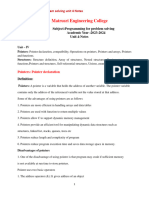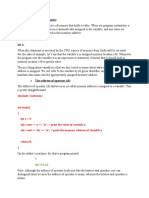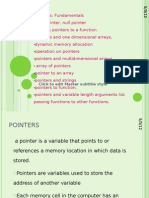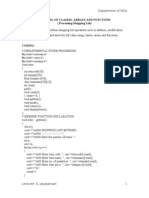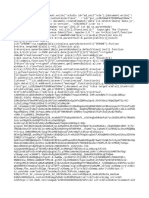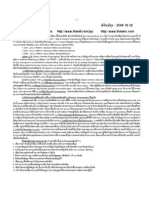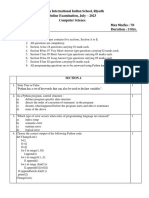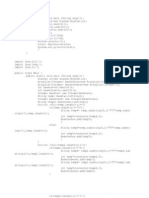Professional Documents
Culture Documents
Chapter 13
Chapter 13
Uploaded by
alysonmicheaalaOriginal Description:
Copyright
Available Formats
Share this document
Did you find this document useful?
Is this content inappropriate?
Report this DocumentCopyright:
Available Formats
Chapter 13
Chapter 13
Uploaded by
alysonmicheaalaCopyright:
Available Formats
Pointers
13. POINTERS
Objectives Introduction to pointers Pointer Arithmetic Pointers and Arrays Introduction Pointers are variables that hold addresses in C. They provide much power and utility for the programmer to access and manipulate data in ways not seen in some other languages. They are also useful for passing parameters into functions in a manner that allows a function to modify and return values to the calling routine. When used incorrectly, they also are a frequent source of both program bugs and programmer frustration. 5.1 Introduction to Pointers As a program is executing all variables are stored in memory, each at its own unique address or location. Typically, a variable and its associated memory address contain data values. For instance, when you declare: int count = 5; The value "5" is stored in memory and can be accessed by using the variable "count". A pointer is a special type of variable that contains a memory address rather than a data value. Just as data is modified when a normal variable is used, the value of the address stored in a pointer is modified as a pointer variable is manipulated. Usually, the address stored in the pointer is the address of some other variable. int *ptr; ptr = &count /* Stores the address of count in ptr */ /* The unary operator & returns the address of a variable */ To get the value that is stored at the memory location in the pointer it is necessary to dereference the pointer. Dereferencing is done with the operator "*". int total; total = *ptr; /* The value in the address stored in ptr is assigned to total */ The best way to learn how to use pointers is by example. There are examples of the types of operations already discussed below. Pointers are a difficult topic. Don't worry if everything isn't clear yet. Declaration and Initialization Declaring and initializing pointers is fairly easy. int main() { int j; int k;
Pointers int l; int *pt1; /* Declares an integer pointer */ int *pt2; /* Declares an integer pointer */ float values[100]; float results[100]; float *pt3; /* Declares a float pointer */ float *pt4; /* Declares a float pointer */ j = 1; k = 2; pt1 = &j; /* pt1 contains the address of the variable j */ pt2 = &k; /* pt2 contains the address of variable k */ pt3 = values; /* pt3 contains the address of the first element of values */ pt3 = &values[0]; /* This is the equivalent of the above statement */ return 0; } Pointer De-referencing/Value Assignment Dereferencing allows manipulation of the data contained at the memory address stored in the pointer. The pointer stores a memory address. Dereferencing allows the data at that memory address to be modified. The unary operator "*" is used to dereference. For instance: *pt1 =*pt1 + 2; This adds two to the value "pointer to" by pt1. That is, this statement adds 2 to the contents of the memory address contained in the pointer pt1. So, from the main program, pt1 contains the address of j. The variable "j" was initialized to 1. The effect of the above statement is to add 2 to j. The contents of the address contained in a pointer may be assigned to another pointer or to a variable. *pt2 = *pt1; /* assigns the contents of the memory pointed to by pt1 */ /* to the contents of the memory pointer to by pt2; */ k = *pt2; /* assigns the contents of the address pointer to by pt2 to k. */ 5.2 Pointer Arithmetic Part of the power of pointers comes from the ability to perform arithmetic on the pointers themselves. Pointers can be incremented, decremented and manipulated using arithmetic expressions. Recall the float pointer "pt3" and the float array "values" declared above in the main program. pt3 = &values[0]; /* The address of the first element of "values" is stored in pt3*/ pt3++; /* pt3 now contains the address of the second element of values */
Pointers *pt3 = 3.1415927; /* The second element of values now has pie (actually pi)*/ pt3 += 25; /* pt3 now points to the 27th element of values */ *pt3 = 2.22222; / The 27th element of values is now 2.22222 */ pt3 = values; /*pt3 points to the start of values, now */ for (ii = 0; ii < 100; ii++) { *pt3++ = 37.0; /* This sets the entire array to 37.0 */ } pt3 = &values[0]; /* pt3 contains the address of the first element of values */ pt4 = &results[0]; /* pt4 contains the address of the first element of results */ for (ii=0; ii < 100; ii++) { *pt4 = *pt3; /* The contents of the address contained in pt3 are assigned to the contents of the address contained in pt4 */ pt4++; pt3++; } 5.3 Pointers and Arrays In some cases, a pointer can be used as a convenient way to access or manipulate the data in an array. Suppose the following declarations are made, Float temperatures[31]; /* An array of 31 float values, the daily temperatures in a month */ float *temp; /* A pointer to type float */ Since temp is a float pointer, it can hold the address of a float variable. The address of the first element of the array temperatures can be assigned to temp in two ways. temp = &temperatures[0]; temp = temperatures; /* This is an alternate notation for the first element of the array. Same as temperatures = &temperatures[0]. */ The temperature of the first day can be assigned in two ways. temperatures[0] = 29.3; /* brrrrrrr */ *temp = 15.2; /* BRRRRRRR */ Other elements can be updated via the pointer, as well. temp = &temperatures[0];
Pointers *(temp + 1) = 19.0; /* Assigns 19.0 to the second element of temperatures */ temp = temp + 9; /* temp now has the address of the 10th element of the array */ *temp = 25.0; /* temperatures[9] = 25, remember that arrays are zero based, so the tenth element is at index 9. */ temp++; /* temp now points at the 11th element */ *temp = 40.9; /* temperatures[10] = 40.9 */ Pointers are particularly useful for manipulating strings, which are stored as null terminated character arrays in C. A character pointer can also be assigned the address of a string constant or of a character array. char *lpointer = "Hello World"; /* Assigns the address of the literal to lpointer */ char *apointer = str1; /* Assigns the starting address of str1 to apointer */ char *apointer = &str1[0]; /* Assigns the starting address of str1 to apointer */ There is no direct means in the C language to copy one array to another, or one string to another. It must be done either with a standard library function or element wise in a loop. As an example, here is a program that counts the occurrences of each lowercase letter of the alphabet in a string. #include <stdio.h> int main() { int i,j; char buffer[120]; /* Holds input strings */ char *pt; /* A pointer to data type char */ char alphabet[27] = "abcdefghijklmnopqrstuvwxyz"; int alphaCount[26]; /* an array of counts */ /* Initialize counts */ for (i = 0; i < 26; i++) { alphaCount[i] = 0; } while ((pt = gets(buffer)) != NULL) { for (i = 0; i < 120 && buffer[i] != '\0'; i++) { for (j = 0; j < 26; j++) { if (buffer[i] == alphabet[j]) {
Pointers alphaCount[j]++; } } } } for (i = 0; i < 26; i++) { printf("Found %d occurrences of %c\n", alphaCount[i],alphabet[i]); } return 0; } gets reads a line of input into a character array. Its prototype is: char *gets(char *buffer); It returns a pointer to the character string if successful, or NULL if end of file is reached or if an error has occurred. The string is also read into the character array specified as an argument. The character string will be terminated be a "\0", which is standard for C. The first step in this program is to initialize the count array. When you use an automatic variable, you must initialize it. Otherwise, it contains whatever data happened to be at the memory location it is stored in. This will be discussed further in the lesson on variable scope. The while loop in this program reads lines of input until an end of file is encountered. If you run this program, remember that an end of file, EOF, is entered as a control-d or a control-z from you keyboard. This is, after you type the last line of text, type control-z or control-d to enter the End of File character. For each line read in, each character in the line is compared against each letter in the alphabet. If a match is found the appropriate count is incremented. The last step in this program writes out the results. Summary Only an address of a variable can be stored in a pointer variable. Remember that the definition for a pointer variable allocates memory only for the pointer variable, not for the variable to which it is pointing. We cannot store the address of a variable of one type into a pointer variable of another type. The value of a variable cannot be assigned to a pointer variable. When we pass a parameter by address, the corresponding formal parameter must be a pointer variable. When an array is passed as an argument to a function, a pointer is actually passed. In the header function, we must declare such arrays with proper size, except the first, which is optional.
Pointers
Review Questions State whether true or false. 1. Pointer variables declared using the address operator. 2. A pointer can never be subtracted from another pointer. 3. An integer can be added to a pointer. 4. A pointer can hold the address of another pointer. Fill in the blanks. 1. A pointer variable contains as its value of the ________ of another variable. 2. The ________ operator returns the value of the variable to which its operand points. 3. A pointer to an array always holding the address of _________ element. Programming Exercises 1. Write a program using pointers to read in an array of integer and print its elements in reverse order. 2. Write a function (using a pointer parameter) that reverses the elements of a given array.
You might also like
- Computer Programming 2 Prelim To Final ExamDocument296 pagesComputer Programming 2 Prelim To Final ExamJarold Esguerra100% (1)
- Lab: Title: Lab Objectives:: Pointer VariablesDocument14 pagesLab: Title: Lab Objectives:: Pointer Variableselshaday desalegnNo ratings yet
- MotelDocument17 pagesMotelalysonmicheaalaNo ratings yet
- T24-CSD Programming StandardsDocument87 pagesT24-CSD Programming StandardsSohaib Khalil100% (3)
- Pointers in C++Document20 pagesPointers in C++Naveed IqbalNo ratings yet
- FYBCA Sem 2 C Lang Unit 2 - PointerDocument14 pagesFYBCA Sem 2 C Lang Unit 2 - PointerComputer Dept DNCVPSNo ratings yet
- Cpps Mod5@Azdocuments - inDocument23 pagesCpps Mod5@Azdocuments - inMunavalli Matt K SNo ratings yet
- PointersDocument16 pagesPointersRuchita AgarwalNo ratings yet
- C Unit 5Document24 pagesC Unit 5vintageshades96No ratings yet
- C Day - 2 Topics Covered 1. Pointers 2. Structures 3. Unions 1.0 Introduction To PointersDocument17 pagesC Day - 2 Topics Covered 1. Pointers 2. Structures 3. Unions 1.0 Introduction To PointersJayachandra JcNo ratings yet
- C Programming Unit 4.1 PointersDocument33 pagesC Programming Unit 4.1 PointersrishikaNo ratings yet
- PPS Unit-8 Pointers 2marks Ques With AnsDocument6 pagesPPS Unit-8 Pointers 2marks Ques With AnsJay PandeyNo ratings yet
- C Language Ch5Document33 pagesC Language Ch5mihirbhuva1No ratings yet
- Students Material For Pointers Amd Memory AllocationDocument35 pagesStudents Material For Pointers Amd Memory AllocationchanchalNo ratings yet
- Pointers in CDocument22 pagesPointers in CMano RanjaniNo ratings yet
- PointersDocument39 pagesPointersAhmed ElkerdawyNo ratings yet
- C Programming Topic: Pointers Module 1: Pointer BasicsDocument22 pagesC Programming Topic: Pointers Module 1: Pointer BasicsseravanakumarNo ratings yet
- PointersDocument6 pagesPointersياسين الطائيNo ratings yet
- Cps Pointers and Preprocessor Vtu NotesDocument9 pagesCps Pointers and Preprocessor Vtu Notesß.shashank mallyaNo ratings yet
- Pointers in CDocument32 pagesPointers in CHarsimran KaurNo ratings yet
- 08 PointersDocument3 pages08 Pointersanshul_171186418No ratings yet
- Pointers: Memory Cell AddressDocument10 pagesPointers: Memory Cell AddressChirag PatelNo ratings yet
- UNIT 3 C ProDocument8 pagesUNIT 3 C ProRaghuvanshmani RajNo ratings yet
- PPS Unit 4 Notes FullDocument43 pagesPPS Unit 4 Notes FullsirishaNo ratings yet
- Unit 3 PCDocument70 pagesUnit 3 PCaakash sharmaNo ratings yet
- Linked ListDocument46 pagesLinked ListAhalya MNo ratings yet
- Introduction To Pointers-1Document7 pagesIntroduction To Pointers-1Samwel OtienoNo ratings yet
- Unit-4 LDPDocument10 pagesUnit-4 LDPmailkinghimanshuNo ratings yet
- Pointers Unit 4th 2nd SemDocument10 pagesPointers Unit 4th 2nd SemBhanu Prakash ReddyNo ratings yet
- Pointers and Dynamic Memory ManagementDocument30 pagesPointers and Dynamic Memory ManagementramandeepkaursainiNo ratings yet
- TCS 305-As04Document28 pagesTCS 305-As04real.lucifer.007No ratings yet
- PointersDocument147 pagesPointersSoumya VijoyNo ratings yet
- PointerDocument32 pagesPointerRohit YadavNo ratings yet
- C PointersDocument13 pagesC PointersLakshit SharmaNo ratings yet
- PointersDocument11 pagesPointersRaonarNo ratings yet
- Unit - V Pointers, Structures & Unions, Files: M.Srinivasa Rao, Ass - Prof, CSE DepartmentDocument24 pagesUnit - V Pointers, Structures & Unions, Files: M.Srinivasa Rao, Ass - Prof, CSE DepartmentMohan Shankar MummanaNo ratings yet
- C Pointers: Declaring A PointerDocument44 pagesC Pointers: Declaring A PointerBhanu PrakashNo ratings yet
- 1st ChapterDocument22 pages1st ChapterKaranpal Singh JulkaNo ratings yet
- Pointer in CDocument7 pagesPointer in CcnpnrajaNo ratings yet
- CHAPTER 2 PointerDocument12 pagesCHAPTER 2 PointermulualemNo ratings yet
- Handout 6 CSM 1101Document14 pagesHandout 6 CSM 1101Mohammad SulaimanNo ratings yet
- Standard C++ With Object-Oriented Programming BOOK CH 4Document51 pagesStandard C++ With Object-Oriented Programming BOOK CH 4mrs.mohmedNo ratings yet
- Pointers PDFDocument28 pagesPointers PDFadarsh rajNo ratings yet
- PointersDocument33 pagesPointersJulie SmithNo ratings yet
- Pointers in C - C++Document41 pagesPointers in C - C++Amr ATIANo ratings yet
- Pointers Due To Which C Is A Unique LanguageDocument39 pagesPointers Due To Which C Is A Unique LanguageVivek MarakanaNo ratings yet
- Pointers and ArraysDocument14 pagesPointers and ArraysJayant AsudhaniNo ratings yet
- Pointers in CDocument32 pagesPointers in CkingraajaNo ratings yet
- Pointers in C++Document26 pagesPointers in C++AmelaNo ratings yet
- MODULE 4 PointersDocument52 pagesMODULE 4 PointersABHISHEK TRNo ratings yet
- Chapter2 PointersDocument41 pagesChapter2 Pointerskgebrie23No ratings yet
- PointerDocument119 pagesPointerCrick XNo ratings yet
- Ch10 - Pointers RevisionDocument27 pagesCh10 - Pointers RevisionMohsin AliNo ratings yet
- Chapter-3. Pointer & StructureDocument18 pagesChapter-3. Pointer & StructureQuazi Hasnat IrfanNo ratings yet
- Lecture13 Pointers ArrayDocument26 pagesLecture13 Pointers ArraymkarunbharathNo ratings yet
- Programming For Problem Solving Unit-V: PointersDocument12 pagesProgramming For Problem Solving Unit-V: PointersMohd MuqeetNo ratings yet
- PointerDocument31 pagesPointerYashNo ratings yet
- What Is PointerDocument16 pagesWhat Is PointerRehaal KoliNo ratings yet
- 004 ProgrammingNotesDocument39 pages004 ProgrammingNotesAditi VermaNo ratings yet
- PointersDocument8 pagesPointerstovilasNo ratings yet
- Fun CallDocument7 pagesFun CallcnpnrajaNo ratings yet
- RulerDocument4 pagesRuleralysonmicheaalaNo ratings yet
- NnnyDocument9 pagesNnnyalysonmicheaalaNo ratings yet
- MergerDocument16 pagesMergeralysonmicheaalaNo ratings yet
- LatitudeDocument16 pagesLatitudealysonmicheaalaNo ratings yet
- EmailDocument21 pagesEmailalysonmicheaala50% (2)
- HalloweenDocument16 pagesHalloweenalysonmicheaalaNo ratings yet
- TorrentDocument5 pagesTorrentalysonmicheaalaNo ratings yet
- LinkedList HDocument15 pagesLinkedList HRadenSue Raden Abd MuinNo ratings yet
- Syllabus BTech First Yr PPS R-17-18Document2 pagesSyllabus BTech First Yr PPS R-17-18Rajkamal K GuptaNo ratings yet
- Chapter 4 - RepetitionDocument19 pagesChapter 4 - RepetitionAyoub fgdNo ratings yet
- Assembly Programming Journal - Issue 4Document49 pagesAssembly Programming Journal - Issue 4lesutsNo ratings yet
- MSFlexgrid All Funs SubsDocument44 pagesMSFlexgrid All Funs SubsNui NguyenNo ratings yet
- Data Structure KayteeDocument3 pagesData Structure KayteeInocent NdazaNo ratings yet
- Python in A Nutshell: Python's Whys & HowsDocument4 pagesPython in A Nutshell: Python's Whys & Howstvboxsmart newNo ratings yet
- Working of Classes, Arrays and Functions (Processing Shopping List)Document42 pagesWorking of Classes, Arrays and Functions (Processing Shopping List)Malathi SankarNo ratings yet
- CourseDocument2 pagesCourseDIVYANSHUNo ratings yet
- Valliammai Engineering College: Question Bank - Ge 6151 - Computer Programming Unit I - IntroductionDocument6 pagesValliammai Engineering College: Question Bank - Ge 6151 - Computer Programming Unit I - IntroductionIplroy JasaonNo ratings yet
- FDocument20 pagesFMelinda R. FranciscoNo ratings yet
- C++ WorkshopDocument47 pagesC++ WorkshopSheeba DhuruvarajNo ratings yet
- JavaintroDocument14 pagesJavaintroMr.PNo ratings yet
- (Document Title) : Submitted By: Sp21-Bcs-048 (Hassan Arslan)Document7 pages(Document Title) : Submitted By: Sp21-Bcs-048 (Hassan Arslan)Haider JuttNo ratings yet
- Csc186topic 4 - Part2Document14 pagesCsc186topic 4 - Part2Nurain DamiaNo ratings yet
- Programming Practices QuestionsDocument29 pagesProgramming Practices QuestionsBoby RathourNo ratings yet
- What Do You Mean by SoftwareDocument185 pagesWhat Do You Mean by Softwaresaumitra ghogaleNo ratings yet
- XIIComp SC Term1431Document7 pagesXIIComp SC Term1431moammedNo ratings yet
- PC Dmis Basic PDFDocument349 pagesPC Dmis Basic PDFmikadoturk67% (3)
- TM01 Apply Object-Oriented Programming Language SkillsDocument104 pagesTM01 Apply Object-Oriented Programming Language SkillsCherinet dubaleNo ratings yet
- Hots Comp Science XiiDocument80 pagesHots Comp Science Xiiapi-238757880100% (1)
- Modern Memory Safety in C CPP PDFDocument290 pagesModern Memory Safety in C CPP PDFArman KhandakerNo ratings yet
- USACODocument3 pagesUSACOWilliam HuangNo ratings yet
- Trigonometric RatiosDocument19 pagesTrigonometric RatiosRo Jill Palacio OlingNo ratings yet
- MCQ On C Language PDFDocument6 pagesMCQ On C Language PDFalokNo ratings yet
- Module 3 Test Answers Py EseDocument7 pagesModule 3 Test Answers Py EseReza Naxx Sukamandi0% (1)
- Fill in The Blanks: Package Is A Collection of ClassesDocument32 pagesFill in The Blanks: Package Is A Collection of ClasseskaushikNo ratings yet
- Lesson A20 - PolymorphismDocument8 pagesLesson A20 - PolymorphismwecallarallyNo ratings yet























